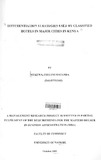| dc.contributor.author | Mukewa, Collins M | |
| dc.date.accessioned | 2013-05-14T13:43:27Z | |
| dc.date.available | 2013-05-14T13:43:27Z | |
| dc.date.issued | 2005-10 | |
| dc.identifier.citation | Masters Of Business Administration (MBA) Degree, University of Nairobi | en |
| dc.identifier.uri | http://erepository.uonbi.ac.ke:8080/xmlui/handle/123456789/22672 | |
| dc.description | A management research project submitted in
partial fulfillment of the requirement for the
Degree of Master of Business Administration (MBA),
Faculty of Commerce, University of Nairobi | en |
| dc.description.abstract | Hotel industry forms an important support to the tourism sector which makes a considerable
contribution to Kenya's economy. This industry has seen high competition in the last fears
years as the tourism sector continues to experience an upturn. Hotels in Kenya offer closely
related services hence need for hotels to adopt differentiation. This study was aimed at
establishing the extent to which classified hotels in Kenya's major cities, Nairobi and
Mombasa were using differentiation strategies. The list of population was drawn from
classified hotels listed in the Kenya Gazette Notice of July 2004. The study was guided by
the following objectives: First, to determine the extent to which differentiation strategies are
used by hotels to develop and sustain competitive advantage. Second, to establish whether
there was a relationship between the differentiation strategies used and the Hotels bed
occupancy.
Primary data was collected using a semi-structured questionnaire that had been divided into
two parts. Part I contained questions on the general background information of the hotel
while Part II contained questions on a likert scale aimed at determining the extent to which
hotels had adopted differentiation strategies and also the impact of these strategies.
Descriptive statistics was used to analyse data.
The study found that local investment in the industry was higher compared to the foreign
one. Travel agents were found to be a very important vehicle in booking of customers hence
the need for hotels to design good understanding and relationship with these channels. In
service provision, the research established that friendliness to customers is practiced to a
large extent and than any other aspect of service delivery. The study established the need for
hotels to ensure that the staff are informed of the product and services available in the hotel.
The study found that the new products and services need to be based on the customer
preferences and tastes. It was found that hotels carry out periodic surveys to ensure standards
of services and facilities are up to date, and use of the industry benchmark to set and improve
quality standards. The study established that communication was the most important aspect
of personnel differentiation followed by personnel reliability, staff competence, and
promptness in handling problems. The study established that hotels do not largely use media
as a dimension of differentiation and that it was the least used aspect of differentiation not
only in image differentiation but also the other differentiation options. Hotels should
encourage the employees to pursue further studies both as a motivating factor and as a means
for career development. Customer training as a differentiator has been under-utilised despite
its viability hence there is need for hotels to re-look at customer training as a differentiation
strategy.
The study covered the classified hotels in Nairobi and Mombasa only. This left out classified
hotels located outside these two cities. The study did not include unclassified hotels. Getting
access to some hotels and senior managers was an uphill task. The researcher was denied
access to three hotels. The researcher recommends a similar study for lodges and resorts, and
differentiation strategies used by classified hotels in other cities in Kenya. A study could also
be carried out on the differentiation strategies used by unclassified hotels. | en |
| dc.language.iso | en | en |
| dc.publisher | University of Nairobi | en |
| dc.title | Differentiation strategies used by classified hotels in major cities in Kenya | en |
| dc.type | Thesis | en |
| local.publisher | School of Business | en |

